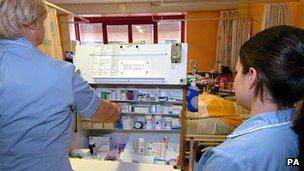Jeremy Hunt attacks 'complacent' hospitals
- Published
- comments

Mr Hunt said his words were aimed at the bulk of hospitals that were not excellent and not poor
Too many hospitals are coasting along, settling for meeting minimum standards, according to the health secretary.
In a speech on Friday, Jeremy Hunt will attack a culture of "complacency" and "low aspirations", which he believes is holding the NHS in England back.
He is expected to say while there is a concerted effort to tackle failing hospitals, there should also be a focus on "mediocrity".
Labour's Andy Burnham blamed ministers for the failings in front line care.
Mr Hunt's comments come a month after the problems at Stafford Hospital were laid bare.
The final report of the public inquiry into the scandal, published at the start of February, attacked the way the system protected corporate self-interest rather than putting patients first.
The warnings have already led to investigations into 14 hospital trusts with high death rates.
But Mr Hunt, in a speech to the Nuffield Trust think-tank in Dorking, Surrey, will say part of the challenge is tackling "mediocrity and low expectations before they turn into failure and tragedy".
'Complacency'
"Coasting can kill. Not straight away, but over time as complacency sets in, organisations look inwards, standards drop and then suddenly something gives," he will say.
"I would never describe the majority of hospitals or wards in the NHS as mediocre - but I do believe our system fails to challenge low aspirations in too many parts of the system.
"Imagine for a moment that the main objective for our Olympic athletes was not to win but to 'not come last'. How many gold medals would we have won then?
"It sounds ridiculous doesn't it? But today I want to suggest that too much of the NHS is focused on doing just that.
"Not on achieving world class levels of excellence - the gold medals of healthcare - but meeting minimum standards, the equivalent of 'not coming last'."
Sources said Mr Hunt's words were aimed not at those that are failing minimum standards or waiting time targets, but the bulk in the middle that were not excellent and not poor.
Family test
Richard Kirby: We get some critical responses as well as some positive ones
He is expected to single out Walsall Manor, a hospital in the West Midlands, which has turned itself around after faring badly in the national patients' survey two years ago. The hospital decided to carry out one-to-one interviews with 100 patients to find out what they thought of their care and the staff that looked after them.
On the Today programme, Richard Kirby, chief executive of Walsall NHS Healthcare Trust, said this led to investment in specific areas flagged up by patients and a better understanding of what patients want. The Trust has also introduced a friends and family test.
"Every patient who is admitted to our hospital is asked when leaving if they would recommend us to friends and family and scores are shared with all of our teams week in, week out.
Jo Webber from the NHS Confederation: ''People come to do the best they possibly can for patients''
"We get critical and positive responses. It gives us a simple, clear way of understanding how we are doing."
Katherine Murphy, of the Patients Association, said the health secretary was right to draw attention to the issue.
"There is a malaise in the NHS which has allowed mediocrity to become commonplace," she said.
"We hear from patients every day who are not happy with their care. I am not talking about the really bad, just those that are not putting patients first."
Investment
But shadow health secretary Mr Burnham said it was "no good for ministers to blame hospitals and staff when it is they who have thrown the whole system into chaos with a huge re-organisation, which has siphoned £3bn out of front line care.
Shadow Health Secretary Andy Burnham: "Coasting is the last thing hospitals are doing - they are working flat out."
"Hospitals across England are on a knife-edge and they need a government that provides support rather than points the finger," he said.
Royal College of Nursing director general Peter Carter said: "From one perspective I absolutely agree with him, of course we don't want mediocrity.
"But to make sure that does not happen we need to invest in staff. When we won one gold medal in the 1996 Olympics we started investing in our athletes, rowers and cyclists.
"To achieve gold medal standards in the NHS we need to do the same. It requires proper leadership, time to train and appropriate pay."
Mike Farrar, chief executive of the NHS Confederation, said there was room for improvement, adding hospitals needed to be more open and transparent.
"I believe that there is a crucial opportunity to make this culture change happen. We cannot miss this chance to deliver better care."
- Published6 February 2013
- Published22 November 2012
- Published23 November 2012
- Published22 November 2012
- Published9 November 2012
- Published18 September 2012
- Published28 June 2012